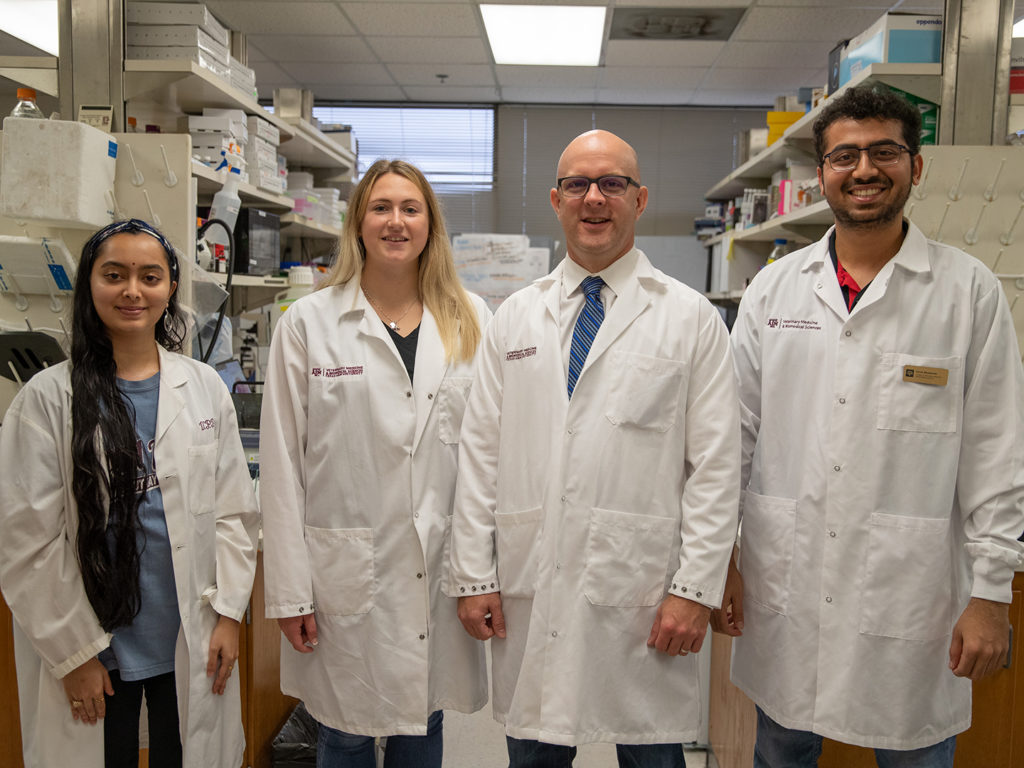Texas A&M Study Suggests Father’s Alcohol Consumption Has Consequences During Conception
Story by Dorian Martin '06
Researchers found that the mother’s placenta is healthier if the father has limited or no alcohol consumption during conception.

A father’s alcohol consumption may affect the mother’s placenta and, in turn, the unborn child, according to a new study from Texas A&M University’s School of Veterinary Medicine and Biomedical Sciences (VMBS).
Published Aug. 11 in Frontiers in Cell and Developmental Biology, “Paternal Alcohol Exposures Program Intergenerational Hormetic Effects on Offspring Fetoplacental Growth” builds on Dr. Michael Golding’s research into whether a father’s alcohol consumption can have repercussions on the pregnancy process or the child’s development of fetal alcohol spectrum disorder (FASD).
This latest study analyzes the mother’s placenta, a transient organ that develops in the uterus during pregnancy to provide oxygen and nutrients to the unborn infant. The placenta also removes the child’s waste products through the umbilical cord. Once the pregnancy ends, the woman’s body expels the placenta.
The Texas A&M researchers’ analysis identified many abnormal epigenetic tags in the sperm of alcohol-exposed males as well as differences in the mother’s placenta.
“What we’ve shown is a nice correlation between abnormalities in the sperm and abnormalities in the placenta,” said Golding, an associate professor in the VMBS’ Department of Veterinary Physiology & Pharmacology (VTPP). “We can’t see differences in the embryo, but we can see them in the placenta. That suggests that what we’re studying here is being transmitted from the dad down into the placenta—and it has a very real effect on the placenta’s blood flow, hormone production, and functioning.”
The study found that the mother’s placenta is healthier if the father has limited or no alcohol consumption during conception—but there are significant consequences if the father drinks the equivalent of two to four glasses of wine or four bottles of beer a day.
“At the higher doses of alcohol, you see the histological destruction where the placenta’s tissue is just not formed correctly and there are a lot of abnormalities,” Golding said.
Ultimately, this study suggests that the male’s alcohol consumption should be discussed as part of the pregnancy journey.
“When a couple is considering getting pregnant, the focus is on what the woman should do—and there’s no consideration of the male’s health on any dimension,” Golding said. “There’s actually much more information coming from males than simply DNA. There’s a whole host of molecules and memories being imparted from the father that influence fetal health and pregnancy success. This is something that doctors need to start contemplating when they’re advising their patients.”
The study also was co-authored by Texas A&M students Kara Thomas, Katherine Zimmel, Alison Basel, Alexis Roach, Nicole Mehta, Kelly Thomas, Luke Dodson, and Yudhishtar Bedi.
###
For more information about the Texas A&M College of Veterinary Medicine & Biomedical Sciences, please visit our website at vetmed.tamu.edu or join us on Facebook, Instagram, and Twitter.
Contact Information: Jennifer Gauntt, Director of VMBS Communications, Texas A&M College of Veterinary Medicine & Biomedical Sciences, jgauntt@cvm.tamu.edu, 979-862-4216


